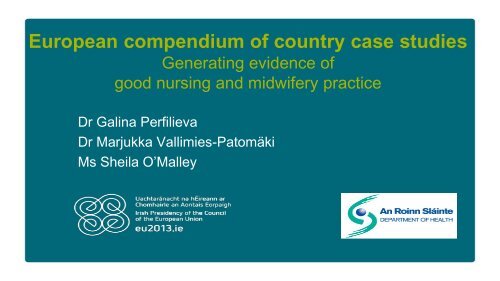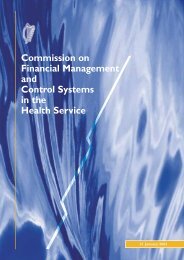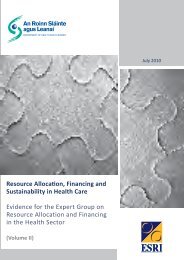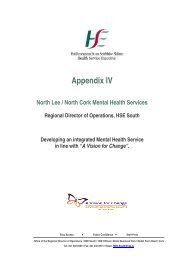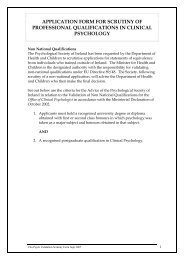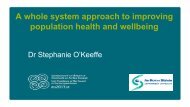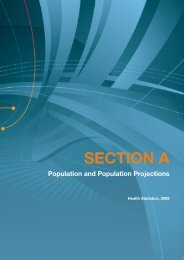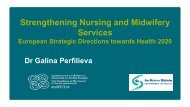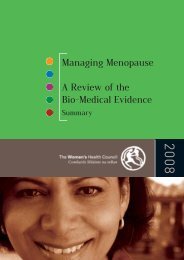Dr G Perfilieva Dr M Vallimies S O'Malley - Department of Health ...
Dr G Perfilieva Dr M Vallimies S O'Malley - Department of Health ...
Dr G Perfilieva Dr M Vallimies S O'Malley - Department of Health ...
- No tags were found...
You also want an ePaper? Increase the reach of your titles
YUMPU automatically turns print PDFs into web optimized ePapers that Google loves.
Evidence generated through country case studies• WHO expert group established, May 2012• <strong>Dr</strong>aft template developed and discussed atthe WHO CIS CNOs meeting, St.Petersburg, Russia, October 2012• <strong>Dr</strong>aft manual consulted with externalexperts• Work on country case studies initiatedEU Chief Nursing Officers’ MeetingDublin, Ireland
Country Case Studies• The target group:– GCNMs and National focal points on N&M– Directors <strong>of</strong> WHO Collaborating Centres– Presidents <strong>of</strong> the NNMAs• Focus on:– Different population groups, health needs, levels <strong>of</strong> health care services– Reviewing roles <strong>of</strong> nurses and midwives within the country context• To be compiled into a WHO European compendium– Reflect the diversity <strong>of</strong> countries and country’s experiences in the region– Share information and learn from each other– Inspire and encourage the development and dissemination <strong>of</strong> good nursing andmidwifery practices– Demonstrate to policy makers the contribution <strong>of</strong> nurses and midwives– Stimulate policy recommendations based on evidence and develop an Action planEU Chief Nursing Officers’ MeetingDublin, Ireland
The template• Provides a tool:– to guide author/s in creating country case studies• GCNMs and national focal points are invited to lead, facilitate and coordinate contributionsfrom national experts in creating country case studies• WHO Collaborating Centres are expected to support and develop this work on the basis <strong>of</strong>their mission• Information can be collected from publications, service areas or via interviews withnurse/midwife managers, researchers, practitioners and teachers• A steering group <strong>of</strong> key stakeholders can be established at national level to support andguide the work• Case study requirements: in English between 500 – 1 000 wordsEU Chief Nursing Officers’ MeetingDublin, Ireland
The template structure Title and country <strong>of</strong> the case studyFoundationHow and why started?ProcessWhat was done?BenefitsWhat were theoutcomes?<strong>Dr</strong>iver for changeRole expansionInitiator <strong>of</strong> the service changeArea <strong>of</strong> health careStakeholdersEvidence-based practiceSkills and competencies developedManagement supportMultidisciplinary team supportAny other supportGuidelines and regulatory frameworkPerformance outcomesImproved quality <strong>of</strong> carePr<strong>of</strong>essional climateMultidisciplinary team dynamicPersonal reflectionContact person: Name, e-mail address, position, institution and countryEU Chief Nursing Officers’ MeetingDublin, Ireland
Sample country case study:Respiratory Assessment Unit (RAU)St. James’s Hospital - Dublin, Ireland• Respiratory Assessment Unit (RAU)– Nurse and physiotherapist-led service– Seamless integrated care for patients with chronic respiratory disease• 3 Levels <strong>of</strong> care– Early discharge– RAU evaluation– Pulmonary RehabilitationEU Chief Nursing Officers’ MeetingDublin, Ireland
Filling in the templateFoundationHow and why started?Title and country <strong>of</strong> thecase study<strong>Dr</strong>iver for changeRole ExpansionInitiator(s) <strong>of</strong> the servicechangeArea <strong>of</strong> health careStakeholdersEvidence-based practiceRespiratory Assessment Unit (RAU)St. James’s Hospital, Dublin – IrelandPressure on Hospital BedsAutonomous nursing role developed to:•Enable early discharge•Provide home care•Integrate management <strong>of</strong> disease•Provide health education and promotion programs•Collaborate with physiotherapistsNursing and Physiotherapy StaffAcute Hospital/Primary Care•Multi-disciplinary Team•Hospital Management•Patient/Family•Primary Care TeamInternational, National and Local GuidelinesEU Chief Nursing Officers’ MeetingDublin, Ireland
Filling in the templateTitle and country <strong>of</strong> thecase studyRespiratory Assessment Unit (RAU)St. James’s Hospital, Dublin – IrelandProcessWhat was done?Skills and competenciesdeveloped•Physical Examination•Taking and interpretation <strong>of</strong> arterial bloodgases•Diagnostic Imaging ordering and interpretation•Anaphylactic Training•Mantoux Testing and Spirometry•Cognitive Behaviour TherapyManagement support•Consultant•Senior Nurse Management•Pr<strong>of</strong>essional Development SupportEU Chief Nursing Officers’ MeetingDublin, Ireland
Filling in the templateProcessWhat was done?Title and country <strong>of</strong> the case studyMultidisciplinary team supportRespiratory Assessment Unit (RAU)St. James’s Hospital, Dublin – Ireland•Nurses•Physiotherapists•Respiratory Consultants•Respiratory Technicians•Public <strong>Health</strong> Nurses•Community Intervention Team•Social Workers•Our Lady’s Hospice•General Practitioners/Primary Care TeamAny other supportGuidelines and regulatoryframeworkFinancial Support:•Further Education•Continuous Pr<strong>of</strong>essional Development•Nurses and Midwives Act•Scope <strong>of</strong> Practice•Code <strong>of</strong> Ethics for NursesEU Chief Nursing Officers’ MeetingDublin, Ireland
Filling in the templateTitle and country <strong>of</strong> the case studyRespiratory Assessment Unit (RAU)St. James’s Hospital, Dublin – IrelandBenefitsWhat were theoutcomes?Performance outcomesImproved quality <strong>of</strong> carePr<strong>of</strong>essional climate•Reduced length <strong>of</strong> stay•Less hospital admissions•Job satisfaction for staff•Autonomous Nurse Led Services•Effective utilization <strong>of</strong> staff skills and competencies•Cost savings•Holistic Patient Care•Improved Quality <strong>of</strong> Life•Patient Satisfaction•Less Hospital Admissions•Better Disease Control•Support for expanding scope <strong>of</strong> practice <strong>of</strong> nurses•Multi-disciplinary collaborationMultidisciplinary team dynamic•Close working relationships between Nursing Teamand Physiotherapy <strong>Department</strong>.•Expertise from the wider MDT utilised.EU Chief Nursing Officers’ MeetingDublin, Ireland
Filling in the templateTitle and country <strong>of</strong> the case studyRespiratory Assessment Unit (RAU)St. James’s Hospital, Dublin – IrelandPersonal reflection<strong>Dr</strong>ive, fearlessness and perseverance.Practice analysed continuously in response to service needsSupport from Respiratory Consultants and Nurse Management facilitated nurse-led autonomous services.Contact person: Name, e-mail address, position, institution and countryMaria Kane, Clinical Nurse Manager 3Respiratory/TB Services St James’s HospitalEmail: mlawlor@stjames.ieEU Chief Nursing Officers’ MeetingDublin, Ireland
Evidence from IrelandEU Chief Nursing Officers’ MeetingDublin, Ireland
Conclusions• Effective utilisation <strong>of</strong> nurses and midwives skills is essential• Service needs must be the driver for changing roles and roleexpansion• Nurses and midwives are working in multidisciplinary teams• Nurses and midwives must work within their scope <strong>of</strong> practice• Commitment to maintain competence is crucial.EU Chief Nursing Officers’ MeetingDublin, Ireland
Engagement <strong>of</strong> experts in N&M intothe WHO workThe WHO Regional Office for Europe calls forexperts’ contributions in creatinga European compendium <strong>of</strong> country casestudies to demonstrate evidence on impact<strong>of</strong> good nursing and midwifery practices onhealth outcomes.EU Chief Nursing Officers’ MeetingDublin, Ireland


